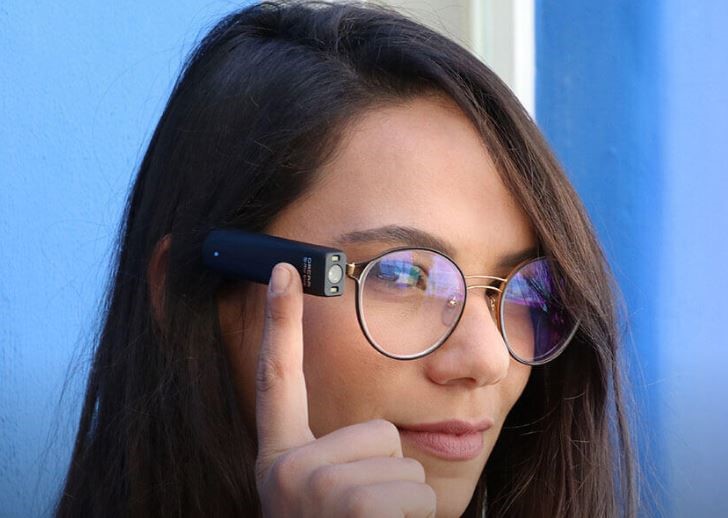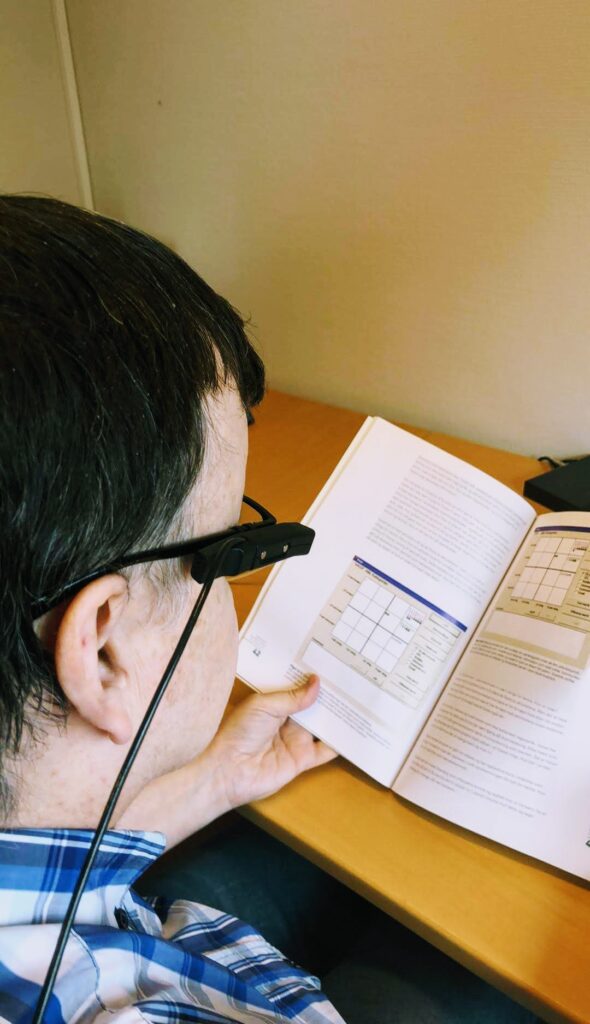OrCam - a camera that sees for you

Eikholt is the national training centre for this user group. People come here from all over the country. They are here for several days at a time and we have plenty of time to map needs and test solutions.

Together with our users, we are constantly looking for new and better ways to manage everyday life.
OrCam is a relatively new aid for the visually impaired on the Norwegian market, and is available via the NAV Assistive Technology Centre. OrCam is a very small, rechargeable camera that attaches to one of the temples of ordinary glasses. The camera can photograph most ordinary text and turn it into speech (OCR processing). The user can take a picture with a light click of the index finger on the camera. The inbuilt audio output on the back of the camera immediately starts reading the photographed text in a voice.
We have tested the aid and were impressed. OrCam reads all printed text without any problems. We were even more impressed when we realised that the camera could also read signs from a long distance. On one occasion, we stood 100 metres from a supermarket and read the sign with the name of the shopping centre and opening hours. OrCam read everything flawlessly.
We also tested the possibility of pointing to what you want to read. We pointed to signs and we pointed to text on boards and in newspapers. We pointed to instructions for use and tables of contents on packages, menus and prices. OrCam starts reading the text from where you point. If you want to stop reading, just make a "stop" gesture with your hand in front of the camera and OrCam stops.

But OrCam can do more. OrCam can learn to recognise faces and objects. When OrCam recognises a person, it will usually say "a man" or "a woman". However, if it is a person whose name you have taught OrCam, it will say the name, for example "Arne". In other words, you can store the name of people, but also of products. Once OrCam has been told what a product is and what its name is, it will recognise it and say what it has learned. This could be ordinary consumer items that we need to recognise, but also the difference between banknotes and credit cards, which can be easy to confuse.
[OrCam is a tiny, discreet camera that attaches to the glasses via a pair of small magnets. The camera attaches securely to the glasses when you hold it against the temple. The advantage is that you can easily take the camera on and off the glasses whenever you want. This is probably necessary because the operating time is limited to a couple of hours, which limits its use. The camera is charged in the same way as a mobile phone, so it's not a big problem once you've learnt the routines.
Most Orcam units supplied in Norway understand two languages, usually Norwegian and English, but many other language combinations are available. The sound comes out via a mini speaker on the back of the camera, which is closer to the ear due to its placement on a pair of glasses. On the Eikholt, all of the users are hearing impaired, so we were excited to see how OrCam would work for them. For most people, this works well in conjunction with hearing aids without the need to make any adjustments, but ambient noise can hinder the reading. "When we tested OrCam in a shopping centre, noise from other people, all the refrigerated counters and the ventilation system were so distracting that our users had problems. So it's good that it's possible to send the signals directly via Bluetooth from Orcam to the hearing aid. It helps considerably. Most hearing aid users have personalised settings stored in their hearing aids.
There are also some limitations with OrCam. For us, it's important that a potential user has good enough hearing to utilise the "voice" from OrCam. In other words, you can't be deaf or completely blind, we believe. It may be possible for some blind people to learn where the camera is looking and train themselves to start the camera correctly, but it seems difficult. But for people with severely impaired vision, whether it's reduced visual acuity and/or field of vision, OrCam works elegantly. It will co-operate and is able to read most things. The only limitation is handwriting - for now. But we wouldn't be surprised if it soon manages that too. It's really smart.
